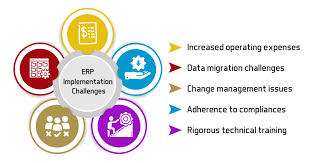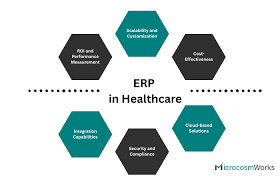Introduction
In today’s complex healthcare environment, organizations face growing challenges in managing patient data, ensuring regulatory compliance, and streamlining operations. ERP for healthcare (Enterprise Resource Planning) is transforming the way hospitals, clinics, and medical institutions operate by integrating all functions into a single, efficient system. For providers seeking both efficiency and compliance, ERP solutions are no longer optional—they are essential.
As a trusted IT solutions provider since 2013, Singleclic helps healthcare organizations implement tailored ERP systems that align with industry standards and deliver measurable results.
What is an ERP System in Healthcare?
An ERP system in healthcare centralizes core operations—such as finance, human resources, patient management, supply chain, and compliance tracking—into a unified platform.
Instead of relying on multiple disconnected tools, healthcare ERP software provides:
- Real-time access to patient records
- Automated billing and claims processing
- Integrated inventory and supply management
- Streamlined HR and payroll systems
- Regulatory reporting and compliance dashboards
This holistic approach reduces errors, improves transparency, and ensures seamless collaboration across departments.
Why Healthcare Needs ERP for Efficiency & Compliance
1. Operational Efficiency
Healthcare providers often struggle with manual processes and siloed systems. ERP automates repetitive tasks, optimizes scheduling, and enhances decision-making through data analytics. The result is faster patient care delivery and reduced administrative overhead.
2. Regulatory Compliance
Healthcare regulations such as HIPAA, GDPR, and regional compliance frameworks require strict monitoring and reporting. ERP systems include compliance modules that track policies, generate audit trails, and protect sensitive patient data. This not only ensures adherence but also minimizes the risk of legal penalties.
3. Cost Reduction
By eliminating redundancies and improving resource allocation, ERP reduces unnecessary expenses. Hospitals can manage budgets more effectively and allocate funds toward improving patient care.
4. Data Accuracy & Security
ERP platforms consolidate patient and operational data in a secure environment. With built-in encryption and access control, sensitive information remains protected from breaches and unauthorized access.
What is the Most Popular ERP for Healthcare?
There are several widely used ERP solutions in the healthcare sector, including SAP, Oracle NetSuite, Microsoft Dynamics 365, and Epic Systems. The choice depends on organizational size, budget, and regulatory needs. Many providers also opt for customized ERP solutions developed by experienced partners like Singleclic to ensure the system aligns with their specific workflows.
How Does ERP Help with Compliance?
ERP solutions help healthcare organizations maintain compliance by:
- Storing patient data securely with encryption and role-based access
- Generating automatic audit reports for regulators
- Tracking staff certifications and licensing requirements
- Monitoring adherence to local and international data privacy laws
With real-time compliance dashboards, healthcare executives can identify risks early and take corrective measures proactively.
What are the Four Types of ERP?
ERP systems are generally categorized into four types:
- On-Premise ERP – Installed locally on a hospital’s servers, offering high control but requiring in-house IT management.
- Cloud-Based ERP – Hosted on the cloud, ensuring scalability, cost-effectiveness, and remote access.
- Hybrid ERP – A mix of on-premise and cloud, offering flexibility for organizations in transition.
- Industry-Specific ERP – Tailored for specialized industries like healthcare, ensuring compliance and sector-specific functionalities.
Healthcare providers often prefer industry-specific ERP because it comes with built-in compliance features and healthcare workflows.
Related Resource
For a deeper understanding of ERP across industries, explore our guide: Industry-Focused ERP Implementation: Driving Efficiency Across Sectors.
Conclusion
Healthcare is an industry where precision, compliance, and efficiency are paramount. By adopting a robust ERP for healthcare, organizations can enhance patient care, reduce costs, and ensure full compliance with ever-changing regulations.
With over a decade of expertise, Singleclic provides end-to-end ERP implementation services customized for healthcare institutions. From system design to deployment and ongoing support, we ensure your ERP solution drives measurable outcomes.
📞 Contact Singleclic today at +2 010 259 99225 / +971 42 475421 / +966 58 1106563 or visit https://singleclic.com/ to learn how ERP can transform your healthcare operations.






